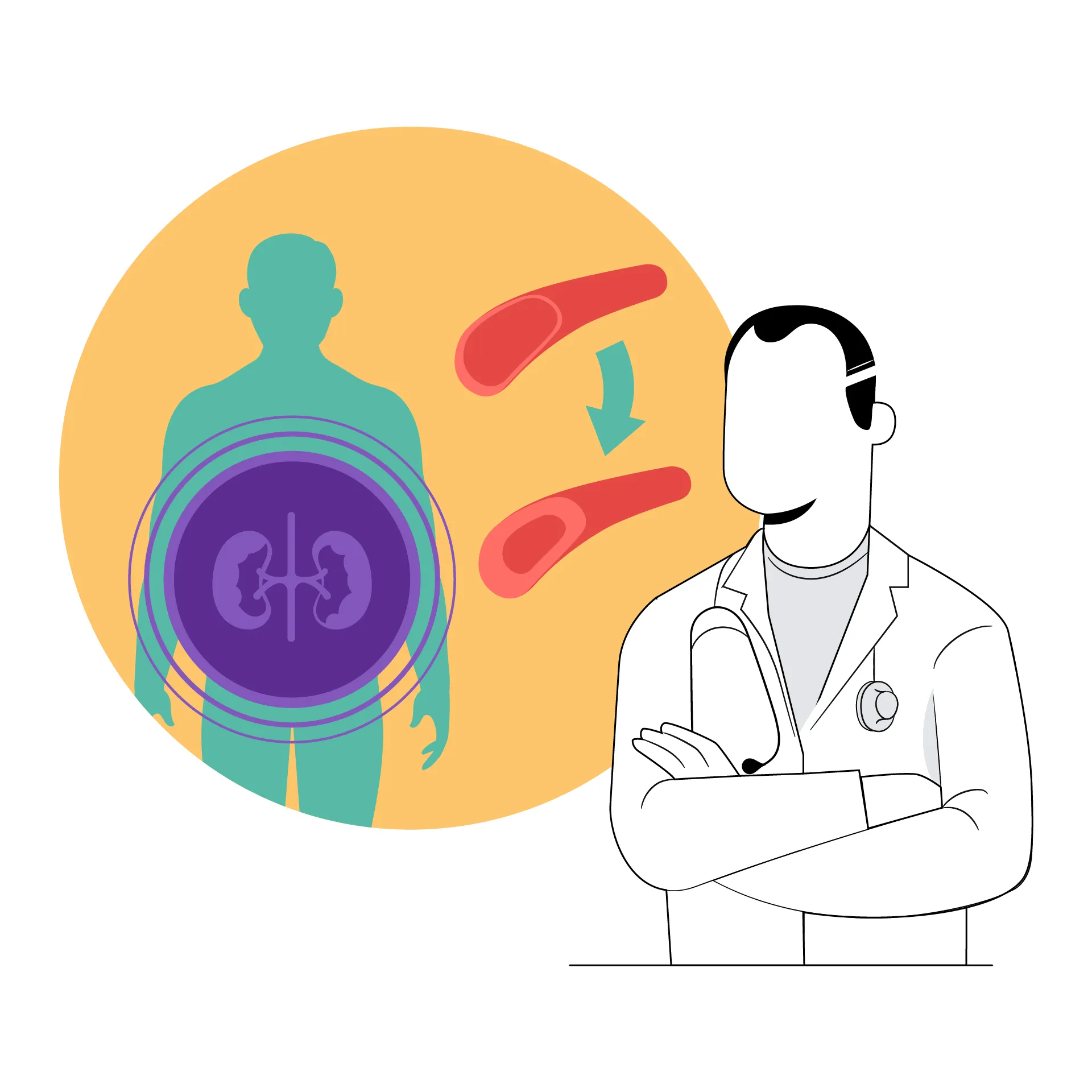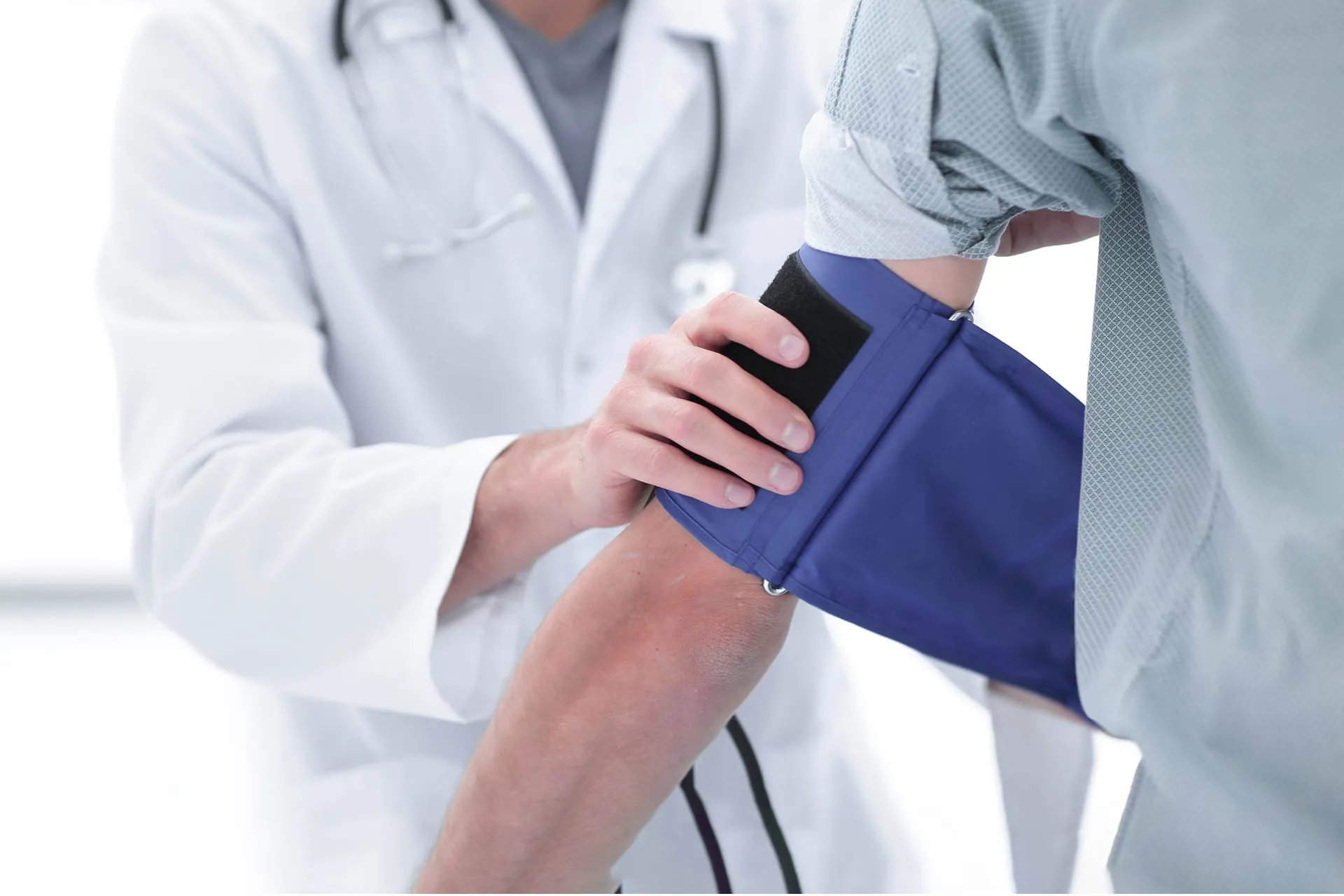Hypertension | 4 min read
Renal Hypertension: Guide to Symptoms, Causes, and Treatment
Medically reviewed by
Table of Content
Key Takeaways
- Having high blood pressure in your kidney leads to renal hypertension
- Edema, headache, and chest pain are some renal hypertension symptoms
- Renal hypertension treatment includes medication and surgical procedures
Renal hypertension occurs when the blood vessels that carry blood to your kidneys become narrow. When your kidneys do not receive sufficient blood, they create a hormone as a reaction. This hormone production elevates your blood pressure. Renal refers to kidneys and hypertension refers to high blood pressure. This condition is also known as renal artery stenosis.
In India, hypertension, as well as diabetes, contribute to around 40-60% of cases of chronic kidney disease [1]. However, renal high BP symptoms are treatable through allopathic drugs or ayurvedic medicines for high BP. For instance, pomegranate juice benefits people on dialysis by improving blood pressure [2]. If not treated, renal hypertension can lead to health conditions like heart attack and stroke [3].
Read on to know about renal hypertension its causes, symptoms, and treatment options.
Additional Read: Idiopathic Intracranial HypertensionRenal hypertension causes
Atherosclerosis
Atherosclerotic renal artery stenosis is the most common cause of renovascular hypertension [5]. Atherosclerosis is the hardening or narrowing of arteries due to the formation of plaque in the blood vessels. Note that plaque is the build-up of fat, cholesterol, and other fatty substances, which can narrow or block the blood flow through arteries.

Fibromuscular dysplasia
This condition contributes to fewer cases of renal hypertension, in comparison to atherosclerosis. Though the exact cause of fibromuscular dysplasia is not known, it is clear that it is not caused by the build-up of plaque. In the case of fibromuscular dysplasia, the blood vessels get narrowed by themselves. This condition is more common in women than men [4].
Other causes
Certain other conditions can contribute to the formation of renal hypertension. These include arteritides, radiation fibrosis, compression, renal artery dissection, obstruction due to surgery, and inflammation due to conditions like middle aortic syndrome.
Renal hypertension symptoms
Most times, renal hypertension has no symptoms. You can, however, look out for these warning signs:
- Swelling in hands, feet, and other body parts
- Headaches
- Chest pain
- Confusion
- Loss of appetite
- Blurry or double vision
- Change in urine volume or color
- Nosebleed
- Muscle cramps
- Shortness of breath
- Nausea and vomiting
- Trouble with concentration
- Rapid loss of weight
- Kidneys not functioning properly
- Hypertension during young age
- Itchiness, darkness, numbness, or dry skin
- Narrowing of arteries in other parts of your body
- Multiple medications to manage blood pressure showing no result
Renal hypertension diagnosis
Your doctor may ask about your medical history or conduct a physical exam to gather the information that will help in a proper diagnosis. You may be asked to undergo the following imaging tests to determine renal hypertension.
- Duplex ultrasound
- Computerized tomographic angiography (CTA)
- Magnetic resonance angiogram (MRA)
- Catheter angiogram
Renal hypertension treatment
Most renal hypertension treatment options aim to lower your blood pressure. This helps reduce the risk of kidney damage and protects your overall health. Treatment includes medication, surgery or proper home care.
- Medication
The following two types of medicines for the blood pressure can help your kidney.
- Angiotensin-converting enzyme (ACE) inhibitors
- Angiotensin receptor blockers (ARBs)
Apart from these, your doctor may prescribe diuretics to help remove excess fluid and improve your kidney function.

- Surgery
In some cases, doctors recommend surgical procedures such as angioplasty and renal bypass surgery. Angioplasty is done to widen the affected arteries by making use of a balloon. Renal bypass surgery is done to bypass the blocked arteries by placing stents.
- Lifestyle changes
Consider making the following lifestyle changes to prevent high blood pressure.
- Maintain healthy weight
- Stay active
- Eat a healthy, low sodium diet
- Manage stress efficiently
- Avoid smoking and limit drinking
You can manage renal hypertension with the medication used to treat high BP symptoms. Making lifestyle changes also adds great value. To get the right treatment, find a nearby doctor and book an online doctor consultation on Bajaj Finserv Health. This is an easy way to consult medical experts and book lab tests from the comfort of home!
References
- https://www.ncbi.nlm.nih.gov/pmc/articles/PMC4446915/
- https://www.kidney.org/news/ekidney/january12/PomogranateJuice#:~:text=According%20to%20a%20recent%20study,kidney%20patients%20need%20to%20take.
- https://my.clevelandclinic.org/health/diseases/16459-renal-hypertension
- https://www.mayoclinic.org/diseases-conditions/fibromuscular-dysplasia/symptoms-causes/syc-20352144
- https://www.ncbi.nlm.nih.gov/pmc/articles/PMC7184322/
Disclaimer
Please note that this article is solely meant for informational purposes and Bajaj Finserv Health Limited (“BFHL”) does not shoulder any responsibility of the views/advice/information expressed/given by the writer/reviewer/originator. This article should not be considered as a substitute for any medical advice, diagnosis or treatment. Always consult with your trusted physician/qualified healthcare professional to evaluate your medical condition. The above article has been reviewed by a qualified doctor and BFHL is not responsible for any damages for any information or services provided by any third party.




